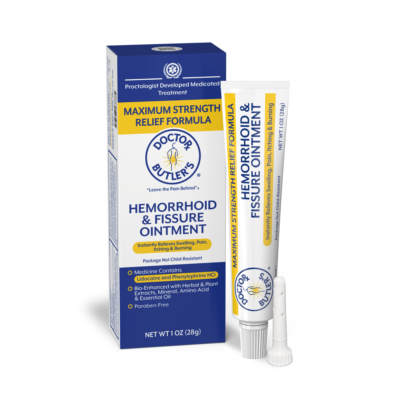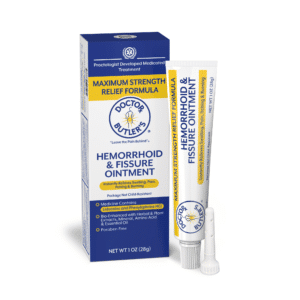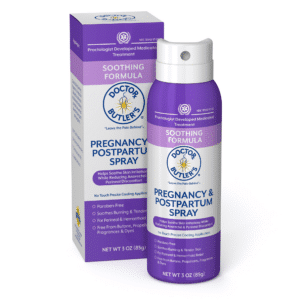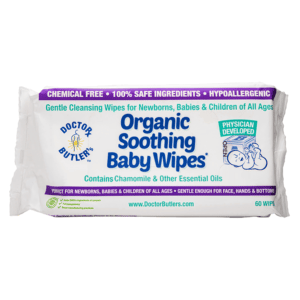Hemorrhoids are embarrassing to talk about, so you might be surprised to know that they’re actually pretty common and you’re far from alone in your pain and uneasiness. Knowing that lots of people deal with them, of course, does nothing to relieve the pain, itching, and swelling that you’re dealing with though, so in this guide, we’re going to teach you how to prevent hemorrhoids (if you can, that is), and what you need to do to ensure that any flare-ups you might experience are few and far between.
We’ll discuss what hemorrhoids are and what causes them, and give you seven straightforward and easy ways to treat and avoid more hemorrhoids. After this, you will know how to prevent hemorrhoids and what you can do about it. If you need help right now, try Doctor Butler’s proctologist made ointment.
Hemorrhoid cream
Really liked the cream it’s very good I recommend !
Verified ReviewerHemorrhoids: The Basics
Believe it or not, hemorrhoids are actually a normal part of your body’s anatomy, and usually, they don’t cause any issues. It’s when they become inflamed or out of place that they become uncomfortable and disruptive to your daily routine. What we commonly refer to as hemorrhoids are blood vessels inside or outside of the anus that become inflamed, swollen, and irritated, making everyday tasks uncomfortable.
There are different types of hemorrhoids and a few known causes. Let’s take a look at what the different types of hemorrhoids are, how they’re caused and how they might form.
Types of Hemorrhoids
There are four different types of hemorrhoids. They include:
- Internal Hemorrhoids – These are hemorrhoids that form inside of the anus. Normally painless, this type of hemorrhoid may bleed a lot, especially after a bowel movement.
- Prolapsed Hemorrhoids – Prolapsed hemorrhoids is what happens when your internal hemorrhoids are pushed outside of the anus, often after a bowel movement, and dangle outside.
- External Hemorrhoids – External hemorrhoids form on the outside of the anus and often cause discomfort in the form of itching, burning, pain, and swelling. They will feel like bumps located just outside of the anus.
- Thrombosed Hemorrhoids – A thrombosed hemorrhoid is when there is a blood clot within a hemorrhoid that can cause blockage to blood flow, creating swelling and a good deal of pain.
Most Common Causes
Hemorrhoids are caused by pressure in and around the anal tissues. This pressure can come from a number of sources. The most common, of course, is straining while you’re trying to go to the bathroom. This can be a result of chronic constipation or diarrhea.
As such, your diet can play a key role in whether or not you experience recurring hemorrhoids as a diet lacking in fiber will cause or exacerbate constipation which can, in turn, cause hemorrhoids. Additionally, dehydration can also help create the conditions required to cause a hemorrhoidal flare-up.
Sitting for prolonged periods of time can also create the pressure required to cause hemorrhoids. If you work at a desk, or perhaps you’re a driver of some kind who is sitting in the driver’s seat for long stretches of road, you might experience this affliction as a result.
Heavy lifting is a known culprit in the causes of hemorrhoids as well, as it creates a great deal of pressure on the lower regions of the body.
Some people may be more prone to hemorrhoids for several different reasons. For instance, expectant mothers often suffer from hemorrhoids. In fact, some statistics suggest half of all pregnant women will experience hemorrhoids during their pregnancy.
Diabetics also experience hemorrhoids at a greater rate than people who do not have diabetes because constipation can be a common occurrence for them. Obesity and a general lack of fitness are also factors that significantly increase your risk of chronic hemorrhoids.
If you fit into any of these categories, you should pay attention to the symptoms of hemorrhoids and follow our preventative advice below.
How Do Hemorrhoids Form?
Hemorrhoids form as a result of pressure. When excessive pressure is put on the anal area, the delicate tissues of the blood vessels in the anus can stretch and bulge, causing swelling, pain, bleeding, itching, and burning. These bulging blood vessels can form inside of the anal cavity as well as outside of the anus.
Signs That You Have Hemorrhoids
The symptoms of hemorrhoids vary depending on what type of hemorrhoids you might have. Internal hemorrhoids tend to have much different symptoms than external hemorrhoids. The signs you’re suffering from either internal or external hemorrhoids are actually pretty clear:
External hemorrhoids tend to be more painful than internal hemorrhoids.
- Pain around the anus is a sign you might be suffering from external hemorrhoids.
- You might also notice swollen bumps that have formed outside of your anal opening.
- The area might also be itchy or you might feel a burning sensation.
- Sitting might be challenging when you’re suffering from external hemorrhoids.
Internal hemorrhoids are much different.
- Often painless, the only way a sufferer might be aware that they have formed is when they notice bleeding after bowel movements.
- The affected area will be irritated and susceptible to bleeding with very little provocation.
Can Hemorrhoids Be Prevented?
Hemorrhoids affect many adults around the world. They can cause a great deal of discomfort so it’s better to prevent major flare-ups and the good news is that it is possible to do so.
If you’re wondering how to avoid getting hemorrhoids, here are numerous ways that you may be able to reduce your likelihood of experiencing this condition, including diet changes, increasing fitness, hydration, and more. Let’s take a look at how to stop getting hemorrhoids.
Hemorrhoid cream
Really liked the cream it’s very good I recommend !
Verified Reviewer
Top 7 Tips For How to Prevent Hemorrhoids
1. Get Enough Exercise
Regular exercise and fitness seem to be preventative measures for a lot of health concerns and that’s because of what they do to your body. When you exercise, you get your blood pumping, which delivers oxygen and nutrients more efficiently to the many tissues in the body.
Fitness will also improve your digestive processes and improve your metabolism, allowing for easier and more regular bowel movements. Fitness is a great way to prevent unnecessary pressure on the tissues in the anus that can form hemorrhoids. Even just a brisk walk every day counts as fitness and can do wonders for reducing your risk of hemorrhoids. Fitness makes a difference.
2. Watch Your Diet
Constipation is often a result of a diet that lacks the daily fiber intake we need. Often, just increasing the amount of fiber you get on a daily basis can make a significant difference for chronic constipation and reduce the risk of hemorrhoids. High-fiber foods like fruit and veggies are a great way to hit your daily fiber goal. Fiber supplements are a great solution if you’re struggling to get enough in your diet.
Some foods are also known to promote constipation, including fried foods, cheese, and excessive dairy (especially if you’re lactose intolerant). If you suffer from celiac disease, you might also increase your risk of hemorrhoids if you choose to eat wheat from time to time. Extremely spicy foods, or any foods that can cause digestive issues, are also a culprit and should be avoided if you want to avoid hemorrhoid flare-ups.
Changing to a good diet for hemorrhoid sufferers is one of the most effective ways to prevent hemorrhoids.
3. Drink Plenty of Water
Hydration is key to preventing many conditions, including hemorrhoids. Drinking enough water can keep your stools soft, which in turn means your bowel movements will be easier. Less strain on the toilet means less pressure on the tissues prone to hemorrhoids and fewer flare-ups.
Stay hydrated, especially if you’re increasing your fitness.
4. Spend Less Time Sitting
Unfortunately for many, sitting for long periods of time can increase your risk of experiencing hemorrhoids. This is a truly challenging fact as so many in this day and age work full-time jobs at a desk. There are some ways around it, however.
For instance, you can invest in a standing desk or a desk that adjusts from a standing to a sitting position, so you can spend at least some of your day standing rather than sitting. You might also take frequent breaks for a quick jaunt around the office.
Balance your work life with exercise in your free time and, if you’re a driver of some kind, make sure you’re pulling off the road for a quick walk during long stretches of driving. The less you sit, the less pressure is put on the anus, which will reduce the likelihood that you’ll experience hemorrhoids.
Additionally, when you sit, choose the best sitting position for hemorrhoids which can include sitting on a memory foam cushion.
5. Go Easy On Laxatives
For those who experience chronic constipation, drugs such as laxatives provide some relief. However, some laxatives trigger contractions in the digestive system which can actually add to the pressure that the tissues in your anus are exposed to. Excessive use can, therefore, increase your risk of hemorrhoids.
If you are suffering from chronic constipation, it’s best to seek the advice of your doctor and get a diagnosis so you know how to properly treat your condition without overusing drugs that could cause hemorrhoids.Don’t Hold It
Avoid holding your bowel movements in, even for brief moments. The best advice is to head to the bathroom as soon as you feel the urge to go. If you experience regular bowel movements, try to plan your day to accommodate them so you don’t find yourself in a position to have to hold it.
The pressure that holding your stool can create is immense, while it also hardens your stool creating the need for more strain when you do reach the toilet. Going when you need to will help you avoid that pressure and strain that may cause hemorrhoids, thereby preventing hemorrhoids altogether.
6. Don’t Strain
Any strain while you’re on the toilet can cause hemorrhoids to form as a result of the pressure that straining produces. You can prevent the need for strain by elevating your feet while you pass a bowel movement. This position straightens out the colon, allowing your stool to pass more freely.
A high-fiber diet, hydration and exercise can also ensure you don’t need to strain as much each time you visit the bathroom.
7. Don’t Stay On The Toilet
The mere act of sitting on the toilet can cause increased pressure on the anal area. We know that bathroom breaks can seem like a convenient time for a little light reading, or maybe even a scroll of social media, but if you sit there long after you’ve gone, you could be helping hemorrhoids to form. It’s important to get up off the toilet as soon as you’re done to avoid any unnecessary pressure that could cause hemorrhoids to form.
Too Late For Prevention Tips? Find Out How We Can Help
Now you know what hemorrhoids are, how they form, and what causes them. You’ve also got a good idea of how to prevent them in the future, including fitness, diet, hydration, and more. But what if you already have hemorrhoids? How can they be treated?
First, it’s always a good idea to see your doctor and get a diagnosis, especially if you’ve been using remedies and there has been no noticeable improvement over the course of a week or two. For most patients, treatment is easy and Doctor Butler’s has a full line of doctor-developed solutions that will help relieve the pain, itching, swelling and general discomfort of hemorrhoids. Check out our hemorrhoid ointment today!
Hemorrhoid cream
Really liked the cream it’s very good I recommend !
Verified ReviewerAlso shop for our soothing hemorrhoid spray that includes healing ingredients such as witch hazel or our wipes that cool and calm the affected area. Try our fast-acting hemorrhoid cream and find some comfort when you sit with our memory foam cushions for hemorrhoids. Don’t wait to experience relief, shop Doctor Butler’s today.




